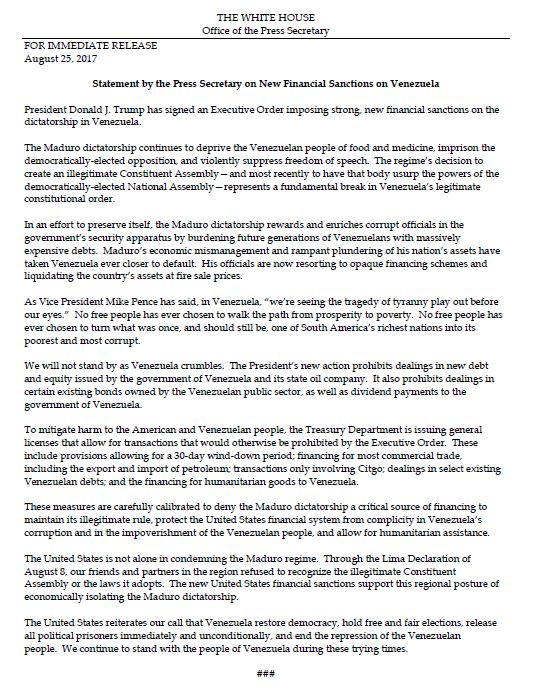'Worst aggression in 200 years': Venezuela stands up to new US sanctions
Caracas has blasted Washington’s new sanctions against Venezuela, following the latest round of restrictions that the Trump administration imposed on the oil-rich country, targeting its energy sector.
On Friday, the Trump administration issued an order prohibiting Americans from dealings in new debt and equity issued by the Venezuelan government and by its state oil company, PDVSA.
The White House said the measures “are carefully calibrated to deny the Maduro dictatorship a critical source of financing to maintain its illegitimate rule.”
“We don’t agree with anything that Maduro is doing,” US Ambassador to the UN, Nikki Haley, said on Friday, calling Venezuela’s recently elected Constituent Assembly a “sham.”
The US will continue to increase pressure on Venezuela until its citizens’ “rights and democracy are fully restored,” said President Donald Trump’s National Security Adviser, H.R. McMaster, announcing the new sanctions alongside US Treasury Secretary Steve Mnuchin.
Exceptions will be made for certain transactions between the US and Venezuela, including petroleum exports and imports involving Citgo, PDVSA’s American unit, as well as financing for humanitarian efforts, Mnuchin said.
Venezuelan Foreign Minister Jorge Arreaza blasted the move, saying “today’s financial sanctions are the worst aggression towards Venezuela in the last 200 years.”
The US is trying to promote a humanitarian crisis in Venezuela, Arreaza said, adding: “We will protect our people and our democracy with all means we have.”
It was not immediately clear how hard the sanctions would hit Venezuela’s vital energy sector and whether they would affect its dealings with investors from other countries.
Earlier in August, PDVSA reduced crude sales to Citgo Petroleum while increasing supply to Russia’s Rosneft, Reuters reported.
Previous sanctions
The US had imposed several rounds of sanctions against individuals and officials in Venezuela, including President Nicolas Maduro, over the Constituent Assembly elections in July, which the US called illegitimate and refused to recognize.
“I am proud of the alleged sanctions... because I do not wag my tail like a lying dog,” Maduro said after the US announced sanctions against him. “I am punished for defending the natural resources of Venezuelan lands.”
Venezuela held the elections following months of street protests and clashes in which more than 100 people have died. Despite the violence and opposition boycott, over 8 million people participated in the process by casting their votes for the 545 candidates who will be empowered to draft a new constitution.
The opposition says that the vote will give the ruling Socialist Party unprecedented powers, as well as a mandate to deny lawmakers parliamentary immunity.
In an interview with RT in July, Maduro said the US was trying to disrupt Venezuela’s economy through an “indirect blockade,” targeting the country’s financial system, adding that the US attempted to do the same thing in 2015 and 2016, with no success.
Possibility of US military intervention
The US said that the Venezuelan leadership “undermined democracy” by conducting the constituent assembly elections.
On August 11, President Trump said he considered a “military option” to resolve Venezuela’s political crisis. In response, Maduro announced a nationwide military drill to fend off a possible “imperialist” invasion.
“I have given the order to the armed forces’ joint chiefs of staff to start preparations for a national civil-military exercise for the integrated armed defense of the Venezuelan nation,” Maduro told supporters who had gathered in the nation’s capital. The drills are scheduled for August 26-27.
“No military actions are anticipated in the near future,” McMaster told reporters on Friday, adding that Trump was presented with “many options” in case the situation in Venezuela deteriorated.
Latin American leaders, including presidents of Colombia, Argentina, Chile and Panama, have spoken forcefully against the possibility of a US military intervention in the country. They conveyed the message to US Vice President Mike Pence, as he traveled to the region to drum up support for US pressure on Maduro.
A number of countries, including the UK, the US and Argentina, have refused to recognize Venezuela’s Constituent Assembly election. Russia, however, said the vote was laying the basis for a peaceful resolution of the issues plaguing the country.
“We regret to note that opposition forces did not respond to the call to take part in the vote, but tried to hamper the elections instead, provoking clashes that have resulted in loss of life. We urge the opposing parties to stop the pointless violent confrontation,” the Russian Foreign Ministry said in a statement on July 31.




0 Comments:
Post a Comment
Subscribe to Post Comments [Atom]
<< Home